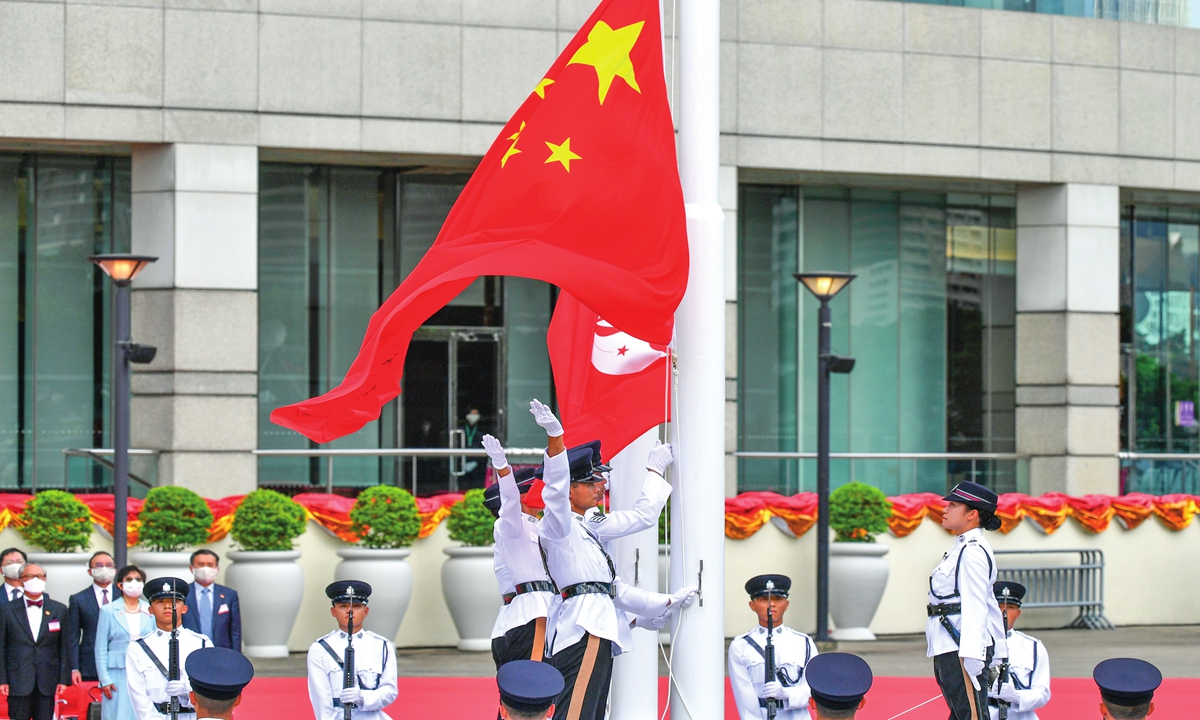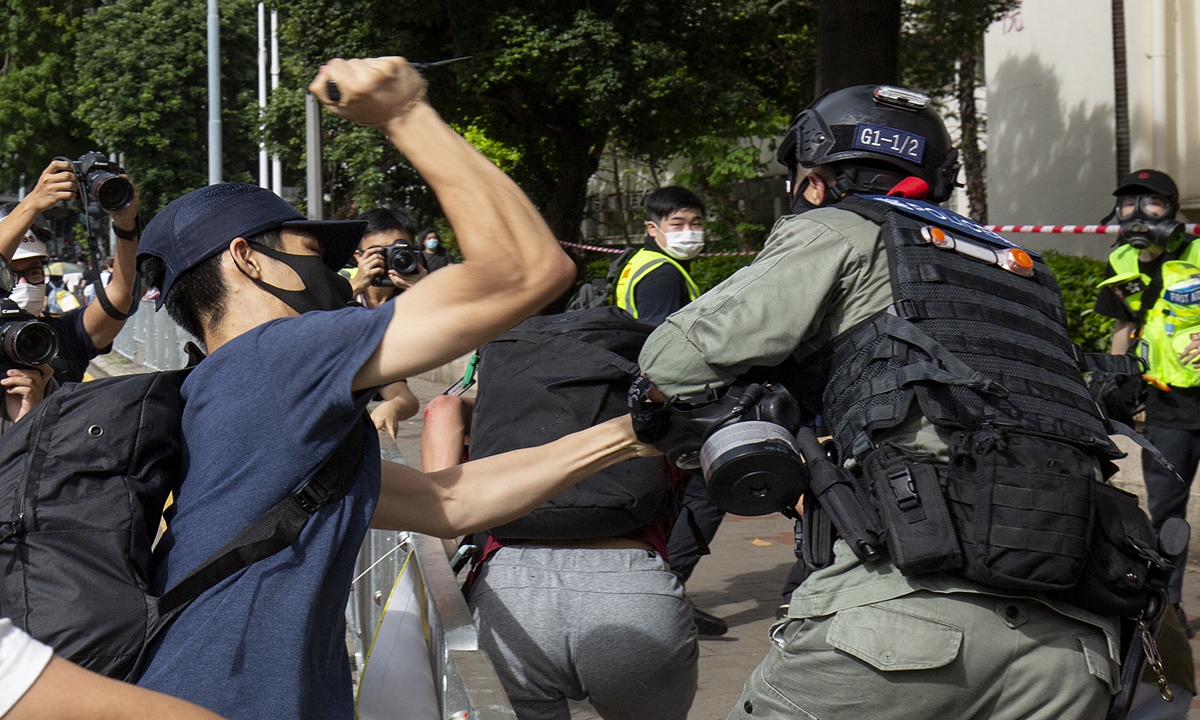Dispelling Western lies about national security law for HK
Freedoms of press, speech enjoyed with limits: expert

The Chinese national flag (front) and the flag of Hong Kong Special Administrative Region are unfurled during a flag-raising ceremony in Wan Chai to mark the 23rd anniversary of Hong Kong's return to China on Wednesday. Photo: AFP
How the West depicts and interprets the national security law for Hong Kong, which was enacted on Tuesday, fully underscores the bias and double standards of some Western politicians and media on Hong Kong affairs.
The US media outlet Foreign Policy alleged that the law would end freedom in the city, which in reality has been enjoying a high degree of autonomy under the principle of "one country, two systems."
CNN also noted that the law would change Hong Kong forever, with potentially massive ramifications for the city's political freedoms.
Reuters said in a headline on Wednesday that "China passes sweeping HK security law, heralding authoritarian era" while western officials like US Secretary of State Mike Pompeo harshly criticized the move of enacting the law, claiming that "the US would not stand idly by while Beijing places Hong Kong into its 'authoritarian maw.'"
Should the majority of Hongkongers be worried that their individual rights and freedom might be eroded by the law? Is it really the death sentence to Hong Kong and would it risk turning the city into a police state? Would the law really deprive Hong Kong people's rights under the Basic Law, including the right of assembly and strikes? Would the law really change the way Hong Kong people live? Here are some false claims and solid facts.
Is the law ending the broader freedoms of a majority of Hongkongers?
Human rights shall be respected and protected while safeguarding national security in the Hong Kong Special Administrative Region, and the majority of Hong Kong people enjoy a number of rights and freedoms, including the freedoms of speech, of the press, of publication, of association, of assembly, of procession and of demonstration, according to the national security law for Hong Kong, which are all in line with the Basic Law and provisions of the International Covenant on Civil and Political Rights and the International Covenant on Economic, Social and Cultural Rights as applied to Hong Kong.
Any legitimate right is clearly defined by the law, which has certain boundaries and scopes. Beyond such bottom lines and scopes, it should bear equivalent legal responsibilities, Shen Chunyao, director of the Legislative Affairs Commission of the National People's Congress Standing Committee, told a press conference on Wednesday.
The law has clearly identified four types of offenses: secession, subversion, terrorist activities and collusion with a foreign country or with external forces to endanger national security. When it comes to subversion, in addition to those who organize, plan, commit or participate in any subversive act with or without force, those who incite and provide assistance to those acts shall be tried.
Lawrence Ma, a barrister and chairman of the Hong Kong Legal Exchange Foundation, told the Global Times on Wednesday that the national security law for Hong Kong is in line with the International Covenant on Civil and Political Rights.
The law won't affect the freedom of speech or other individual rights of the Hong Kong majority as long as they are not involved in those four types of illegal acts, Ma noted.
In many Western countries, including the US, France and Japan, lawmakers have been carefully seeking a balance between freedom of speech and national security or public order-relevant matters, some prohibiting extremist claims or speech with terrorism tendencies. Under the national security law for Hong Kong, as long as the ordinary residents' claims do not carry on the intention of subversion, terrorism, secession and collusion with foreign forces, some general criticism of the government or officials won't be affected, legal experts said.
Freedom of speech has never been absolute. For instance, the Catalonia separatists in Spain have been harshly punished for instigating riots and chaos, which has also earned support from the international community.
Is it the end to the high degree of autonomy the HKSAR has been enjoying?
Some Western media claim the law could undermine Hong Kong's judicial independence. CNN reported on Wednesday that the law allows the government to pick judges that are potentially sympathetic to particular issues, and could undermine judicial independence.
AFP noted that the law would give the central government unprecedented judicial powers in the HKSAR, with jurisdiction over cases, secret trials without jury and a national security agency.
"There is no jury in national security-related trials in many countries, including Singapore. The members of the jury in Hong Kong are ordinary citizens selected by lottery from the jury pool, and the jury is necessary when they can consider a verdict based on common sense. But when it comes to national security-related knowledge, the jury may not provide any additional value," Witman Hung Wai-man, a Hong Kong deputy to the NPC, told the Global Times.
National security affairs are essentially the duty of the central government toward which the HKSAR should fulfill its constitutional responsibilities, while the central government always enjoys fundamental rights, several legal experts told the Global Times. And the law states that "one country" always comes before "two systems."
The law would allow the central government to set up a commissioner's office to safeguard national security in the HKSAR, which would only exercise jurisdiction if the case is complex, involves foreign forces, or if the HKSAR authorities are unable to effectively enforce the national security law, or an imminent threat to national security.
It does not mean an "erosion" of Hong Kong authority. It can be interpreted as a division of responsibilities between central and local authorities to safeguard national security, Lau Siu-kai, a vice president of the Chinese Association of Hong Kong and Macao Studies, told the Global Times.

A protester uses a sharp object against a police officer. The Hong Kong Police Force's newly formed special unit to safeguard national security begins functioning decisively to end riots in the city on Wednesday. More than 370 people have been arrested as of press time. Photo: AFP
Has Hong Kong entered into an authoritarian era?
Some media have also speculated that the law may threaten personal privacy. The Diplomat magazine reported in June that Chinese lawmakers will speed up drafting an amendment to the national security law for Hong Kong, which would facilitate wider law enforcement access to personal data in Hong Kong. It would have an immediate impact on internet companies and financial services providers in Hong Kong.
Many Western countries have their own intelligence agencies and national security laws when it comes to riots and violence. They enforce the laws in a much more intense manner compared to what authorities have done in Hong Kong, Lau told the Global Times. "I think such a claim is double standard, which deliberately slanders the legislature," Lau said.
They themselves know that every government has the power and the responsibility to safeguard its national security. Why can't the Chinese central government exercise such power over Hong Kong, which is part of China? Lau asked.
Will "unjustified" law enforcement and the "secret police" turn HK into a police state?
Extremists and pro-independence forces, including Joshua Wong, Agnes Chow and Nathan Law, announced their withdrawal from anti-government groups hours before the law took effect, with Wong saying that "with sweeping powers and an ill-defined law, the city will turn into a secret police state," media reported.
Such claims were later referred to the special unit set up under the Hong Kong Police Force, upon approval of the Chief Executive of HKASR, carrying out interception of communications and conducting covert surveillance on a person who is suspected, on reasonable grounds, of having been involved in the commission of an offense which endangers national security, according to the law.
There have been similar legal arrangements and means in other countries when it comes to national security-related matters. For example, in the US, the 9/11 attacks in 2001 brought the US government's fear of terrorism to a boiling point, leading to the Patriot Act. The law expanded the powers of US law enforcement agencies in monitoring citizens' information and in detaining and expelling expatriates suspected of having links to terrorism.
The essence of the national security law is to use severe punishment as a deterrent to eliminate the crimes that might have occurred, Lau said, noting that it is not a truly effective national security law if raids and frequent prosecutions are needed.